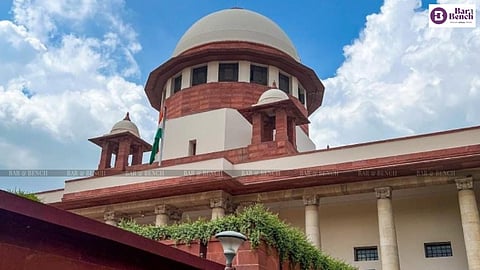
- Latest Legal News
- News
- Dealstreet
- Viewpoint
- Columns
- Interviews
- Law School
- Legal Jobs
- हिंदी
- ಕನ್ನಡ

The Supreme Court recently held that mere breach of contract does not give rise to criminal prosecution for cheating unless a fraudulent or dishonest intention was present right from the beginning of the transaction [Sarabjit Kaur v. State of Punjab and Another].
A division bench of Justices Abhay S Oka and Rajesh Bindal was of the view that merely on the allegation of failure to keep up promise, criminal proceedings cannot be initiated.
"A breach of contract does not give rise to criminal prosecution for cheating unless fraudulent or dishonest intention is shown right at the beginning of the transaction. Merely on the allegation of failure to keep up promise will not be enough to initiate criminal proceedings," the Court said.
The Court also cautioned against using criminal cases to pressurise parties to settle civil disputes.
"Criminal courts are not meant to be used for settling scores or pressurise parties to settle civil disputes," the bench said.
By way of background, a first information report (FIR) was registered against the accused-appellant under Sections 420 (cheating), 120B (criminal conspiracy) and 506 (criminal intimidation) of the Indian Penal Code (IPC).
The basis of this FIR was a third complaint made by the complainant-respondent against the appellant with regard to allegations of cheating in an agreement to sell of a property.
In the previous two complaints which were based on the same set of facts as the third complaint, the complainant-respondent had only made the prayer for return of the amount paid by him in the agreement to sell with no allegation of cheating.
Moreover, the said complaints were only directed at the property dealers and not against the appellant.
After investigation, it was found that no no criminal offence was made out with respect to the first complaint and the complainant was, therefore, granted the liberty to invoke the jurisdiction of the civil court.
Similar finding was arrived at in the second complaint as well.
However, in the third complaint, the complainant had accused the appellant of cheating and other offences. On the basis of the same, the FIR Came to be registered against the appellant.
The appellant then moved the Punjab and Haryana High Court seeking quashing of the FIR, but the plea was dismissed.
This was challenged before the Supreme Court.
The apex court after considering the sequence of complaints by the complainant, observed that the effort of the complainant was merely to put pressure on the appellant in order to get his money back.
Moreover, it was also noted that no efforts were made by the complainant to initiate any civil proceedings against the appellant to get the sale deed executed on the basis of the agreement to sell.
Rather, the complainant proceeded only by filing three identical criminal complaints with the police.
Taking note that the allegations made in the complaint are civil in nature, the Court observed:
"The entire idea seems to be to convert a civil dispute into criminal and put pressure on the appellant for return of the amount allegedly paid. The criminal Courts are not meant to be used for settling scores or pressurise parties to settle civil disputes. Wherever ingredients of criminal offences are made out, criminal courts have to take cognizance. The complaint in question on the basis of which F.I.R. was registered was filed nearly three years after the last date fixed for registration of the sale deed. Allowing the proceedings to continue would be an abuse of process of the Court."
Therefore, the Court allowed the appeal and quashed the case.